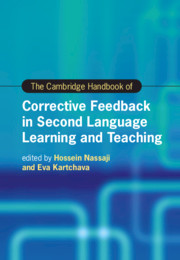Book contents
- The Cambridge Handbook of Corrective Feedback in Second Language Learning and Teaching
- Cambridge Handbooks in Language and Linguistics
- The Cambridge Handbook of Corrective Feedback in Second Language Learning and Teaching
- Copyright page
- Contents
- Figures
- Tables
- Contributors
- Acknowledgments
- Introduction Corrective Feedback in Second Language Teaching and Learning
- Part I Theoretical Perspectives on Corrective Feedback
- Part II Methodological Approaches in the Study of Corrective Feedback
- Part III Different Delivery Modes of Corrective Feedback
- Part IV Feedback Provider, Feedback Intensity, and Feedback Timing
- Part V Corrective Feedback and Language Skills
- 17 Corrective Feedback and the Development of Second Language Grammar
- 18 Corrective Feedback and the Development of Second Language Vocabulary
- 19 Effects of Corrective Feedback on Second Language Pronunciation Development
- 20 Corrective Feedback in Instructional Pragmatics
- 21 Alphabetic Print Literacy Level and Noticing Oral Corrective Feedback in SLA
- Part VI Contexts of Corrective Feedback and Their Effects
- Part VII Learners’ and Teachers’ Feedback Perspectives, Perceptions, and Preferences
- Part VIII Individual Differences, Tasks, and Other Language- and Learner-Related Factors
- Index
- References
20 - Corrective Feedback in Instructional Pragmatics
from Part V - Corrective Feedback and Language Skills
Published online by Cambridge University Press: 26 February 2021
- The Cambridge Handbook of Corrective Feedback in Second Language Learning and Teaching
- Cambridge Handbooks in Language and Linguistics
- The Cambridge Handbook of Corrective Feedback in Second Language Learning and Teaching
- Copyright page
- Contents
- Figures
- Tables
- Contributors
- Acknowledgments
- Introduction Corrective Feedback in Second Language Teaching and Learning
- Part I Theoretical Perspectives on Corrective Feedback
- Part II Methodological Approaches in the Study of Corrective Feedback
- Part III Different Delivery Modes of Corrective Feedback
- Part IV Feedback Provider, Feedback Intensity, and Feedback Timing
- Part V Corrective Feedback and Language Skills
- 17 Corrective Feedback and the Development of Second Language Grammar
- 18 Corrective Feedback and the Development of Second Language Vocabulary
- 19 Effects of Corrective Feedback on Second Language Pronunciation Development
- 20 Corrective Feedback in Instructional Pragmatics
- 21 Alphabetic Print Literacy Level and Noticing Oral Corrective Feedback in SLA
- Part VI Contexts of Corrective Feedback and Their Effects
- Part VII Learners’ and Teachers’ Feedback Perspectives, Perceptions, and Preferences
- Part VIII Individual Differences, Tasks, and Other Language- and Learner-Related Factors
- Index
- References
Summary
This chapter has two broad aims: to explore the potential for a role for corrective feedback in instructional pragmatics; and to review studies of instructional pragmatics that have investigated the effectiveness of corrective feedback. The chapter starts with the observation that there has been a disinclination to correct learners’ pragmatic errors. In fact, studies of instructional pragmatics rarely refer to “errors,” which is a construct integral to feedback studies. Allowing for this difference in orientation, the chapter discusses potential issues related to correcting pragmatic errors, such as challenges in identifying errors, the feasibility of correcting pragmalinguistic versus sociopragmatic errors, and the lack of firm norms to use in correction. Next, the chapter summarizes the findings of nine studies published between 2005 and 2017 and assesses their methodological strengths and weaknesses. The review revealed that although most of the studies reported positive effects for corrective feedback, many of the studies reviewed suffered from major methodological limitations. Owing to the nature of the available evidence, the chapter advocates neither for nor against the implementation of corrective feedback in instructional pragmatics. The chapter concludes by providing guidelines for future principled investigations into the role of corrective feedback in instructional pragmatics.
Keywords
- Type
- Chapter
- Information
- The Cambridge Handbook of Corrective Feedback in Second Language Learning and Teaching , pp. 429 - 449Publisher: Cambridge University PressPrint publication year: 2021
References
- 3
- Cited by

